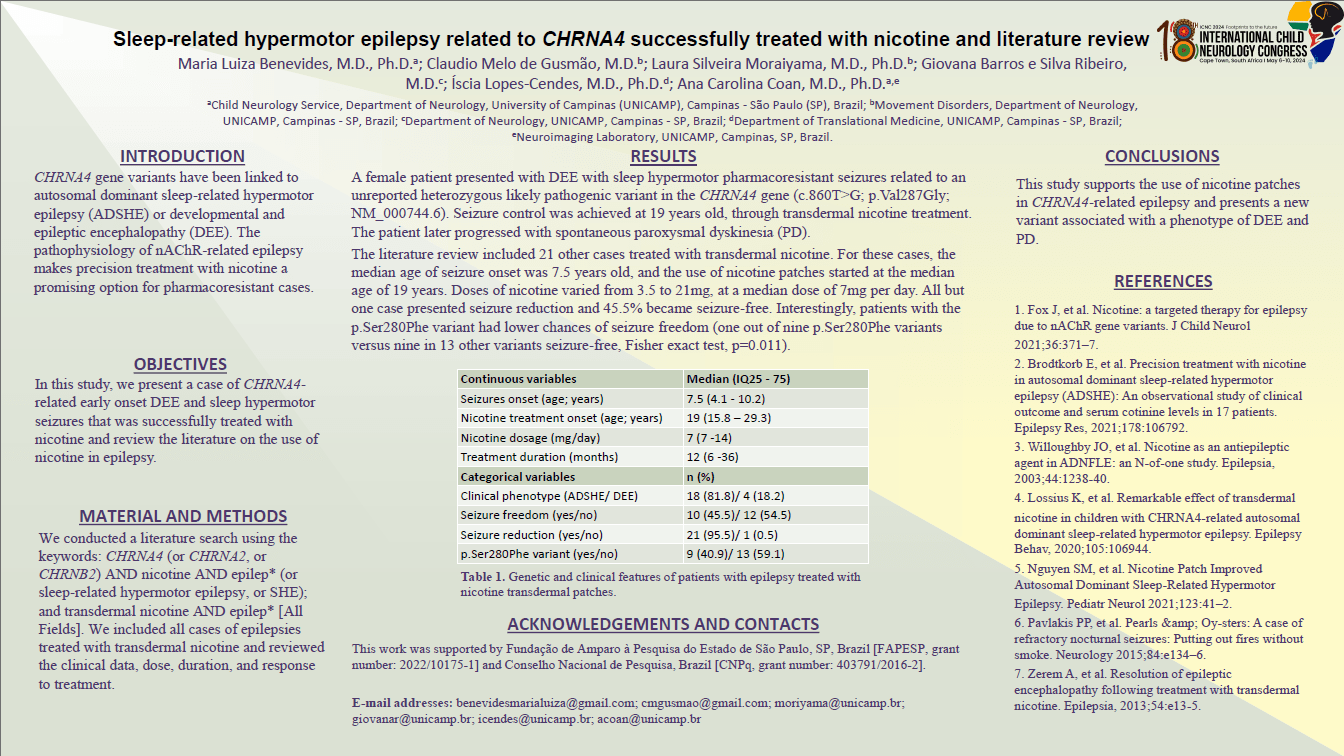Sleep-related Hypermotor Epilepsy Related To CHRNA4 Successfully Treated With Nicotine And Literature Review
Introduction/Aims: CHRNA4 gene variants are associated with autosomal dominant sleep-related hypermotor epilepsy (ADSHE). The pathophysiology of nAChR-related ADSHE makes precision treatment with nicotine promising for pharmacoresistant cases. We described a case of CHRNA4-related ADSHE treated with nicotine, and reviewed the literature of nicotine use in ADSHE. Methods: We searched in PubMed the keywords: CHRNA4 AND nicotine AND epilep*; CHRNA4 AND nicotine AND sleep-related hypermotor epilepsy; CHRNA4 AND nicotine AND SHE [All Fields]. Results: A healthy girl born to non-consanguineous parents, presented with frequent refractory nocturnal seizures by 50 days of life, progressing with developmental delay and mild intellectual development disorder. The EEG showed frontal epileptiform activity and MRI was normal. The genetic epilepsy panel showed an unreported heterozygous variant of uncertain significance in CHRNA4 gene (c.860T>G; p.Val287Gly; NM_000744.6). At 19 years old, refractory epilepsy persisted, so nicotine patch (3,5mg/day) was prescribed. Seizure control was achieved, despite few gastrointestinal symptoms. Two months later, she progressed with spontaneous paroxysmal kinesigenic dyskinesia (PKD) in shoulders and feet. Previously, a distinct CHRNA4 variant was related to PKD phenotype (n=2). In literature review (n=13), 8 were males (53.8%%) and the mean age of epilepsy onset was 6.1 years (SD±3.5). After nicotine patches, 5 (41.7%) patients reached seizure control and 8 (58.3%) improved but remained with sporadic seizures. Rare side effects occurred (nausea and urticaria). Conclusions: This study supports the use of nicotine patches in CHRNA4-related ADSHE and presents a new variant associated with PKD.
Maria Luiza Benevides
University of Campinas (UNICAMP)
Brazil
Cláudio Melo de Gusmão
University of Campinas (UNICAMP)
Brazil
Laura Silveira Moraiyama
University of Campinas (UNICAMP)
Brazil
Giovana Barros e Silva Ribeiro
University of Campinas (UNICAMP)
Brazil
Íscia Lopes-Cendes
University of Campinas (UNICAMP)
Brazil
Ana Carolina Coan
University of Campinas (UNICAMP)
Brazil

Ana Carolina Coan
University of Campinas (UNICAMP)
Brazil